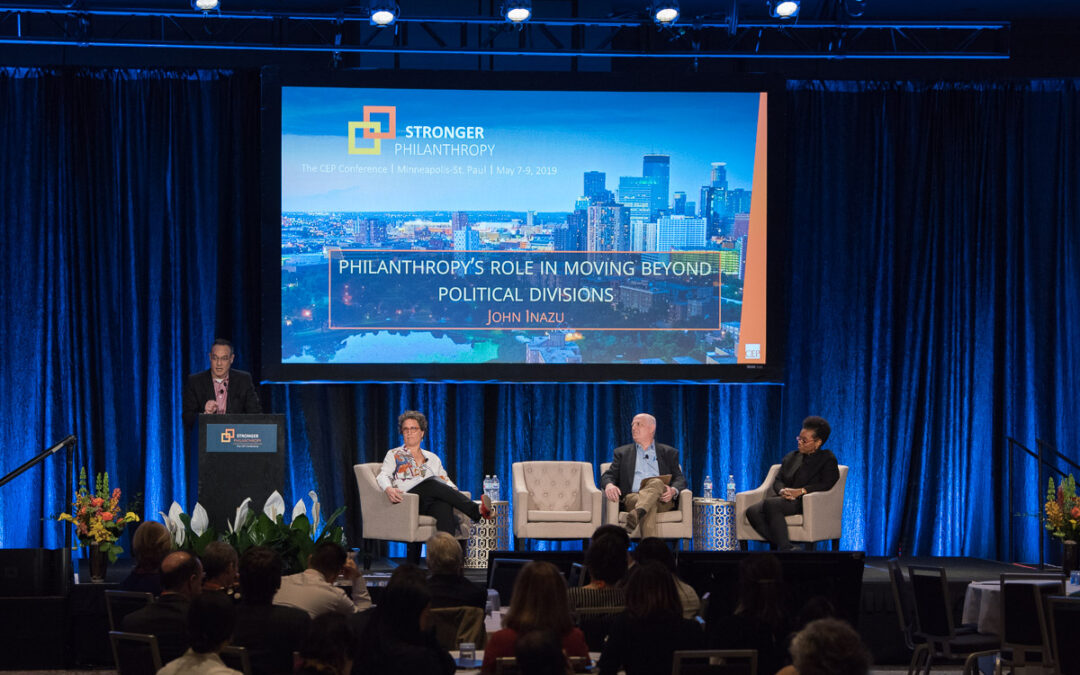I was surprised the first time I heard doubts about why we’re holding our 2013 National Conference in Detroit. When I pressed the person, who works in philanthropy, the skepticism seemed to miss the point.
“You know, it’s an expensive flight, there’s not much to do, and it’s falling apart. Who wants to go to Detroit?”
We all should want to go, everyone who works in philanthropy.
First, it’s an amazing and unique city, as I discovered during my recent trip to the Motor City. And second, in the language of presidential politics, it’s a battleground state, where foundations, nonprofits, and individuals have banded together to fight against decay and despair. How can you not want to go?
Last October, I spent six hours with a friend exploring downtown Detroit, supposed poster child for all that is wrong with our cities.
We hopped on our mountain bikes and started from the historic Westin Book Cadillac Hotel (site of our upcoming conference and renewed to its former glory after a $200 million restoration) and struck out for the Detroit River.
From Hart Plaza, with its imposing and controversial twenty-four foot bronze sculpture of Joe Louis’ forearm and fist, we biked northeast along the Detroit RiverWalk—a combination bike and pedestrian path that follows the river to Belle Isle, the nation’s largest public island park.
After enjoying the magnificent botanical gardens in Anna Scripps Whitcomb Conservancy, we left the river behind and biked to the Lower East Side, arriving at the splendor of the Heidelberg Project. Along with small clusters of art students who were taking pictures, making sketches, and talking in the hushed tones usually reserved for museums, we explored this two block community art project that has endured for more than 26 years.
Downtown, we peered down into Comerica Park, home of the Tigers, and tried to talk our way into the ornate Fox Theatre. As we drifted quietly through a smattering of pedestrians, the setting sun illuminated some of the stunning buildings that make you proud to see what America once built.
I know that two days in Detroit doesn’t make me an expert on the city, its people, and the challenges they face (at the end of 2012, Forbes asked if it was time to let the city go bankrupt). I can only imagine that the difference for those who live downtown, where there’s talk of a “renaissance,” and those living even just a few blocks away is vast.
But I do know that I saw many people who are fighting to thrive, not simply survive. And I know that many foundations work hard alongside these people.
As a t-shirt from the Heidelberg Project says, “Don’t call it a comeback—Detroit’s got talent.”
Detroit does have talent. And passion. And strong allies in the philanthropic sector, allies who in early 2010 were lauded by Time for “pooling their funds … to change the trajectory of an entire metropolitan economy.” At that time, the article noted, one-third of Detroit’s residential parcels were vacant lots or empty homes. One-third of Detroit children attended schools that rank among the state’s bottom five percent. And one-quarter of Detroiters were officially unemployed.
Is it working? In part, that’s what we hope to learn at our conference in May, when the presidents and CEOs of The Skillman Foundation, the Kresge Foundation, the W.K. Kellogg Foundation, and the John S. and James L. Knight Foundation will discuss their successes—and failures—in Detroit. (More about our programming in next week’s blog.)
But for me, holding the conference in Detroit is more than an opportunity to conduct field research or discuss lessons learned. It’s a chance to say loudly and clearly that philanthropy has a duty to confront the challenges sweeping across our country.
As Mayor David Bing says in Detropia, an award-winning documentary, “It’s going to be difficult, the city is broke. I don’t know how many times I have to say that.”
Detroit’s not alone. Greater Boston, where I’ve worked for more than a decade, isn’t about to slide into bankruptcy. But on any given day, the aging public transportation system sputters, fails, and is rebuilt by a band of dedicated MBTA personnel. Many of our bridges are in only slightly better condition.
As I write this, I can see that the police are once again at the bus stop seven stories below me on Massachusetts Ave, helping one of the many homeless people who appear in dire need of professional care.
If Detroit declares bankruptcy, it will join San Bernadino, CA and Jefferson County, AL and begin what is likely to be a long and painful process of recovery, much of which will involve overcoming the stigma of failure.
And even if it escapes Chapter 9, Detroit will almost certainly slash services for those who need it the most and for those who will build our future when they grow up—if they grow up. The cuts will also hit those who help hold a city together: police, firefighters, teachers, and others who work for the people of Detroit.
Whatever Detroit confronts could be coming soon to a city near you, in one fashion or another. Aging infrastructure. Stretched budgets. Privatization schemes. Hard decisions about what we can and can’t fund, decisions that can pit us against one another in a mean scramble for the remains of the American dream, a winner-take-all scramble to the top of the wealth pyramid.
If you’re lucky, your beleaguered city will have people like the intense young man in Detropia who says “We’re not going to accept any more downsizing. We want to hear about up upsizing, big sizing, supersizing Detroit.”
Maybe that’s simply a pipe dream, one person’s deluded refusal to accede to the supposedly inexorable cycle of “creative destruction” that seems to benefit only a powerful or lucky few.
But maybe such resolve and fierce urgency from the people who need our help is exactly what inspired foundations to take a stand in Detroit, pledging millions and millions to fund schools, provide transportation options, strengthen neighborhoods, and gather data to see what works and what doesn’t.
Because the alternative was to simply shrug our shoulders, turn our backs, and say, “Sorry, it’s hopeless. No one wants to go to Detroit.”
It isn’t hopeless in Detroit, or anywhere else. Not yet.
That’s why we’re going back in May of 2013 to hold our national conference on effective philanthropy.
Who wants to go to Detroit?
I do.
Who needs to go to Detroit?
You do. We all do. Philanthropy is hard work, requiring patience and endurance as well as vision and passion. It requires courage. Our collective work in Detroit and across America, on issues from poverty to climate change, has only begun. Now, more than ever, we have to help people not just survive but thrive.
I hope you’ll join us.
The image used in the post is part of the exhibit Detroit Is No Dry Bones at the National Building Museum. Credit: “Detroit Is No Dry Bones,” Ruth Chapel AME Church, 2012. Photo © Camilo José Vergara.
Mark Russell is the Director of Communications & Programming at CEP. Join the discussion about our upcoming Detroit conference on Twitter using hashtag #CEP13.


